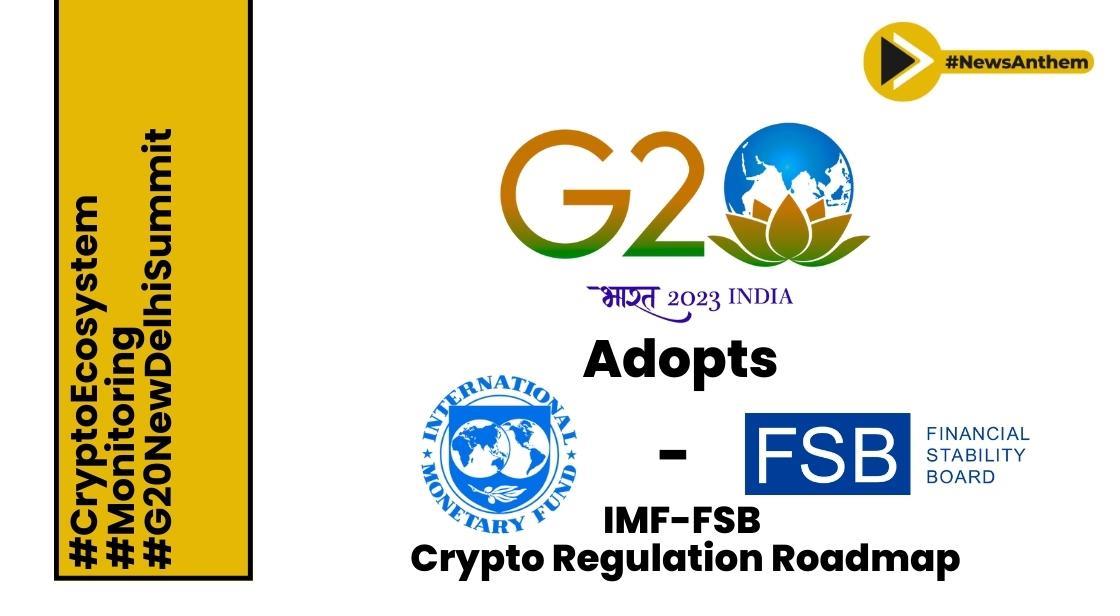G20 Embraces IMF-FSB Proposed Roadmap for Crypto Asset Regulation

News Synopsis
Finance Ministers and Central Bank Governors (FMCBGs) of the G20 nations, under India's Presidency, have officially adopted the proposed roadmap for crypto asset regulation.
This roadmap, put forward by the International Monetary Fund (IMF) and Financial Stability Board (FSB) ahead of the G20 New Delhi Summit in September, is seen as a significant step toward addressing the challenges posed by crypto-assets.
Meeting in Marrakesh: Adoption of the G20 Roadmap
During the sidelines of the IMF and World Bank annual meetings in Marrakesh, Morocco, on October 12-13, the FMCBGs expressed their appreciation for the collaborative effort of the IMF and FSB in preparing the synthesis paper. This synthesis paper formed the basis for the roadmap that the G20 leaders embraced in the G20 New Delhi Declaration.
"We adopt the Roadmap proposed in the Synthesis Paper as a G20 Roadmap on Crypto Assets," stated the communique of the Fourth G20 Finance Ministers and Central Bank Governors Meeting.
Emphasizing the importance of this detailed and action-oriented roadmap, the communique highlighted its role in achieving common goals of macroeconomic and financial stability and ensuring the effective, flexible, and coordinated implementation of a comprehensive policy framework for crypto assets.
Call for Swift Implementation and International Collaboration
The leaders urged the swift and coordinated implementation of the G20 Roadmap, encompassing policy frameworks, outreach beyond G20 jurisdictions, global coordination, cooperation, information sharing, and addressing data gaps.
They specifically called on the IMF and FSB to provide regular and structured updates on the progress of implementing the G20 Roadmap on crypto assets.
Supporting the ongoing work and global implementation of Financial Action Task Force (FATF) standards on crypto-assets, the G20 leaders emphasized their commitment to closely monitor the risks associated with the fast-paced developments in the crypto ecosystem.
Background and India's Stance on Crypto Regulation
Two days before the G20 Summit meeting in New Delhi, the International Monetary Fund (IMF) and Financial Stability Board (FSB) jointly released a paper on crypto assets. The paper emphasized the necessity of a comprehensive policy and regulatory response to address the risks of crypto-assets to macroeconomic and financial stability.
India's position on crypto regulation has underscored the need for international collaboration to evaluate the risks and benefits before any legislation for regulation or banning is considered effective.
Crypto assets are currently unregulated in India, and the government, acknowledging their borderless nature, emphasizes the importance of international collaboration.
The New Delhi Declaration, endorsing the recommendations for crypto asset regulation, reinforces the commitment of G20 leaders to vigilantly monitor the evolving risks in the crypto ecosystem.
Relevant and latest facts:
-
The G20 is an intergovernmental forum of the world's 20 largest economies.
-
The IMF is an international organization dedicated to promoting global financial stability.
-
The FSB is an international body that monitors and assesses the global financial system.
-
Crypto assets are digital or virtual tokens that use cryptography to secure their transactions and to control the creation of new units.
-
Crypto assets have become increasingly popular in recent years, but they also pose a number of risks to macroeconomic and financial stability.
Conclusion:
The G20's adoption of a roadmap for crypto regulation is a significant step forward in addressing the risks posed by these digital assets. The roadmap provides a framework for policymakers around the world to coordinate their efforts to regulate crypto assets in a way that protects financial stability and消費者权益.
Additional thoughts:
The G20's roadmap for crypto regulation is a welcome development, but it is important to note that it is just the beginning of a long process. Implementing the roadmap will require significant international cooperation and will likely take several years.
It is also important to note that the roadmap does not call for a ban on crypto assets. Instead, it focuses on developing a comprehensive regulatory framework that will mitigate the risks posed by crypto assets while still allowing for innovation in the sector.
The G20's roadmap for crypto regulation is a positive step forward, but it is important to remain realistic about the challenges that lie ahead.
You May Like









